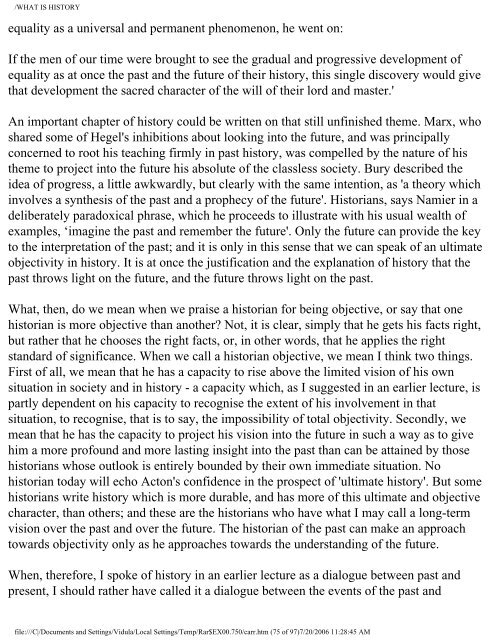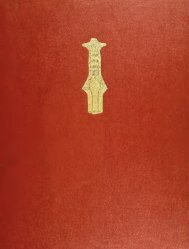What is History / by Edward Hallett Carr - Universal History Library
What is History / by Edward Hallett Carr - Universal History Library
What is History / by Edward Hallett Carr - Universal History Library
Create successful ePaper yourself
Turn your PDF publications into a flip-book with our unique Google optimized e-Paper software.
WHAT IS HISTORY<br />
equality as a universal and permanent phenomenon, he went on:<br />
If the men of our time were brought to see the gradual and progressive development of<br />
equality as at once the past and the future of their h<strong>is</strong>tory, th<strong>is</strong> single d<strong>is</strong>covery would give<br />
that development the sacred character of the will of their lord and master.'<br />
An important chapter of h<strong>is</strong>tory could be written on that still unfin<strong>is</strong>hed theme. Marx, who<br />
shared some of Hegel's inhibitions about looking into the future, and was principally<br />
concerned to root h<strong>is</strong> teaching firmly in past h<strong>is</strong>tory, was compelled <strong>by</strong> the nature of h<strong>is</strong><br />
theme to project into the future h<strong>is</strong> absolute of the classless society. Bury described the<br />
idea of progress, a little awkwardly, but clearly with the same intention, as 'a theory which<br />
involves a synthes<strong>is</strong> of the past and a prophecy of the future'. H<strong>is</strong>torians, says Namier in a<br />
deliberately paradoxical phrase, which he proceeds to illustrate with h<strong>is</strong> usual wealth of<br />
examples, ‘imagine the past and remember the future'. Only the future can provide the key<br />
to the interpretation of the past; and it <strong>is</strong> only in th<strong>is</strong> sense that we can speak of an ultimate<br />
objectivity in h<strong>is</strong>tory. It <strong>is</strong> at once the justification and the explanation of h<strong>is</strong>tory that the<br />
past throws light on the future, and the future throws light on the past.<br />
<strong>What</strong>, then, do we mean when we pra<strong>is</strong>e a h<strong>is</strong>torian for being objective, or say that one<br />
h<strong>is</strong>torian <strong>is</strong> more objective than another? Not, it <strong>is</strong> clear, simply that he gets h<strong>is</strong> facts right,<br />
but rather that he chooses the right facts, or, in other words, that he applies the right<br />
standard of significance. When we call a h<strong>is</strong>torian objective, we mean I think two things.<br />
First of all, we mean that he has a capacity to r<strong>is</strong>e above the limited v<strong>is</strong>ion of h<strong>is</strong> own<br />
situation in society and in h<strong>is</strong>tory - a capacity which, as I suggested in an earlier lecture, <strong>is</strong><br />
partly dependent on h<strong>is</strong> capacity to recogn<strong>is</strong>e the extent of h<strong>is</strong> involvement in that<br />
situation, to recogn<strong>is</strong>e, that <strong>is</strong> to say, the impossibility of total objectivity. Secondly, we<br />
mean that he has the capacity to project h<strong>is</strong> v<strong>is</strong>ion into the future in such a way as to give<br />
him a more profound and more lasting insight into the past than can be attained <strong>by</strong> those<br />
h<strong>is</strong>torians whose outlook <strong>is</strong> entirely bounded <strong>by</strong> their own immediate situation. No<br />
h<strong>is</strong>torian today will echo Acton's confidence in the prospect of 'ultimate h<strong>is</strong>tory'. But some<br />
h<strong>is</strong>torians write h<strong>is</strong>tory which <strong>is</strong> more durable, and has more of th<strong>is</strong> ultimate and objective<br />
character, than others; and these are the h<strong>is</strong>torians who have what I may call a long-term<br />
v<strong>is</strong>ion over the past and over the future. The h<strong>is</strong>torian of the past can make an approach<br />
towards objectivity only as he approaches towards the understanding of the future.<br />
When, therefore, I spoke of h<strong>is</strong>tory in an earlier lecture as a dialogue between past and<br />
present, I should rather have called it a dialogue between the events of the past and<br />
file:///C|/Documents and Settings/Vidula/Local Settings/Temp/Rar$EX00.750/carr.htm (75 of 97)7/20/2006 11:28:45 AM







